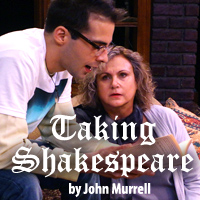
For a considerable amount of time during Taking Shakespeare, I thought John Murrell had titled his play ”Talking Shakespeare” because that‘s mainly what occupies the two characters. Murph, 24, a slacker addicted to video games, can’t “connect” to Shakespeare and thus “make it” in college. His mom, dean of humanities, sends him to her once-inspiring Prof, hoping she can link up boy and bard.
Now in her 60s, Prof some time ago disconnected herself from her school, the humanities staff, studies, and, yes, even teaching Shakespeare. Will she herself get re-connected via a boy who couldn’t get past the middle of Hamlet in high school or at present is put off by the “too-long titles” of assigned Shakespearian comedies?
The title that gets to Murph is Othello along with the idea (he’ll find wrong) that it shows Shakespeare was racist, which he reaches after the first of five Socratic sessions Prof conducts with him. This, despite her feeling that, “By the time you’re old enough to understand it, you’re too old to feel it” the way she so deeply did. And maybe with that loss, the age-begotten understanding gets in the way of teaching.
During their sessions, Murph begins to understand the meanings of words that eluded him and the meaningful story they tell. He figures out and likes certain poetic effects that seem to have eluded her. Case in point: a “heartbeat” at the end of a typical line of iambic pentameter. (It is hard to believe she has been unaware of sprung rhythm, unless that’s a sign of how long she’s been alienated or how little she knows of prosody beyond Shakespeare’s usual.)
No denying the rapport Kate Alexander’s bright but bitter Prof and Graciany Miranda’s promising Murph is touching. It’s exciting to see how their findings of what’s happening in “Othello” invigorate both.
Knowledge of the play isn’t necessary to understand their readings and interpretations. Their central quest, though, seems to be why Iago, so believed to be honest and trustworthy by Othello, wanted to down him, Desdemona, the soldier Cassio, and others, causing chaos.
Spoiler Alert: As someone who, 67 years ago, first taught “Othello” in an English lit survey in a two-year college, I find it hard to believe that -- in addition to all Iago says about a number of his reasons for his actions -- Prof would never have heard the theory of his “motiveless malignancy” before Murph gets to it. Nor should it be a revelation that Iago’s wife Emilia, before she dies, “tells it like it is.” A major problem in John Murrell’s play is his giving very sketchy knowledge of Prof’s background. Although she seems to disparage Murph’s regular teacher of Shakespeare, Prof doesn’t make any real case against her. Also, no matter how bad academic politics may be, Prof has not gone to meetings or published or tried to attract more students to her classes, as always expected of professors. (A mentioned topic of papers she’s assigned and hates having to read sounds deadly.) Then there’s her staying in the same college for 36 years but on “temporary tenure”; is that something real? A perhaps unappreciated thing about Murph is his favorite video “Band Witch” and its complicated relationships. Indeed, because he doesn’t turn off his video games while studying with Prof, she’s being fired by Murph’s mother. What Murph tells about his favorite video shows indicates he could teach Prof a few things, and she might benefit by knowing more about video and TV programs that explain past times and beliefs and sometimes constitute a meaningful mythology for our times.
I think audiences will find the ending somewhat happy. I’m sure that at FST they will be pleased with the fitting set of the Prof’s book-laden apartment, full side tables, worn sofa and chairs good to cuddle up in. The lack of a desktop with all sorts of computer stuff is as telling as the always-on coffee maker. Lighting and costumes are appropriate.
Excellent performances by both actors, surely directed by Tom Key, hold unflagging attention throughout. The production goes as swiftly and surely as Othello itself and is very effective when it focuses on Shakespeare’s text. It drew me to peruse that muse once again, and I think others will do the same.
